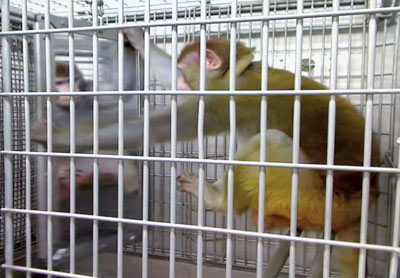Monkeys recognize themselves in the mirror, indicating self-awareness
September 30, 2010

A rhesus macaque monkey stares at himself in a mirror, as the first demonstration that any monkey has a degree of self-awareness. (Luis Populin/University of Wisconsin-Madison)
A study published Sept. 29 by Luis Populin, a professor of anatomy at the University of Wisconsin-Madison, shows that under specific conditions, a rhesus macaque monkey that normally would fail the “mark test” can still recognize itself in the mirror and perform actions that scientists would expect from animals that are self-aware.
The finding casts doubt on both the relevance of the “mark test” and on the existence of a definitive cognitive divide between higher and lower primates.
In the standard mark test, a harmless mark is put on the animal’s face, where it can only be seen in a mirror. If the animal stares at the mirror and touches the mark, it is said to be self-aware: It knows that the mirror shows its own reflection, not that of another animal. (Animals that lack self-awareness may, for example, search for the “invading” animal behind the mirror.)
The finding casts doubt on … the existence of a definitive cognitive divide between higher and lower primates.
Rhesus macaques, a mainstay of medical and psychological research, have long failed the mark test. But in Populin’s lab, the monkeys that got the implants were clearly looking in the mirror while examining and grooming their foreheads, near the implant. Tellingly, they were also examining areas on their body, particularly the genitals, that they had never seen before. In some cases, the monkeys even turned themselves upside down during these examinations. In other cases, they grasped and adjusted the mirror to get a better view of themselves.
Furthermore, although a macaque will often interpret its reflection as representing an intruding monkey and adopt either an aggressive or submissive response, the implanted monkeys showed dramatically fewer of those “social” behaviors compared to the behaviors, such as exploring hidden body parts, that indicate self-awareness, Populin says.
How has self-awareness evolved in distantly related species and where does it stop?
“This report makes a unique contribution to our views about primate self-awareness because the ‘mirror test’ has been the traditional gold standard for determining if a person and/or animal met a criterion for having a sense of self,” says Christopher Coe, a primatologist and professor of psychology at UW-Madison. “If a young child, brain-damaged adult or animal was able to recognize and appreciate that the image in the reflection was really them, then it was interpreted as proof of being aware.”
Thus, Coe says, “If we follow that logic through with the belief that mirror recognition is proof of a sense of self, then we need to extend that attribute at least to rhesus monkeys.”
Scientists who have used the mark test to explore self-awareness have found the quality in one species of bird, in one individual elephant, and in dolphins and orangutans. And so instead of asking how self-awareness evolved only among primates, they face the larger question of how it evolved multiple times in distantly related species.
The mounting data on self-awareness has undermined the concept of a cognitive divide in the primate lineage, Populin says. “There is another idea in primatology, and Charles Snowdon of UW-Madison has contributed to this, that instead of a divide, self-awareness has evolved along a continuum, so we will find it in different forms in different locations on the tree of evolution. I think the mark test may not be sensitive enough to detect self-awareness in the lower species; they may have it, but in a different form, and it may show up in different situations, using different tests.”
Reference (open access): Rajala AZ, Reininger KR, Lancaster KM, Populin LC (2010) Rhesus Monkeys (Macaca mulatta) Do Recognize Themselves in the Mirror: Implications for the Evolution of Self-Recognition. PLoS ONE 5(9): e12865. doi:10.1371/journal.pone.0012865